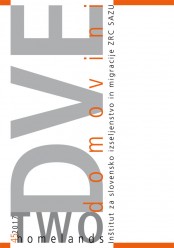“Stultifera Navis” on the Balkan Refugees Route
DOI:
https://doi.org/10.3986/dd.2017.1.04Keywords:
refugees, eurocentrism, biopolitics, “Balkan refugee route”, deinstitutionalisationAbstract
Collection centres and hot spots, asylum and detention centres for refugees are forms of institutionalisation and spatial segregation of people. The well-known processes of the “big confinement”, biopolitics and the creation of “populations” are today pervaded with the ideologies of eurocentrism, culturalisation and cultural racism produced by the media. Compared with the processes of spatial segregation of the disabled in the past, one can conclude that while the deinstitutionalisation was achieved in the west and is in some countries on its way (in Slovenia for example), the institutionalisation of migrants and refugees takes place across Europe. Instead of the construction of the refugees as the national threat, health risk and the cultural Other, the measures of deinstitutionalisation and depathologisation of the refugees’ lives are needed.
Downloads
References
Agamben, Giorgio (2005/1998). Kar ostaja od Auschwitza: Arhiv in priča (Homo sacer III). Ljubljana: Založba ZRC SAZU.
Amin, Samir (2009/1988). Evrocentrizem: Kritika neke ideologije. Ljubljana: Sophia.
Balibar, Étienne (2015). Evropa in begunci: Demografska širitev. Časopis za kritiko znanosti 43, 262, 207–215.
Bradol, Jean Herve (2004). The Sacrificial International Order and Humanitarian Action. In the Shadow of ‘Just Wars’ Violence, Politics and Humanitarian Action (ur. Fabrice Weissman). London: Hurst and Company, 1–24.
Briskman, Linda (2012). Protecting Vulnerable Asylum seekers: Human Rights in Australia. Social Dialogue Magazine 3/3, 24–31.
Caruth, Cathy (1996). Unclaimed Experience: Trauma, Narrative, and History. Baltimore: John Hopkins University.
Feldman, Allen (2015). Archives of Insensible: Of War, Photopolitics and Dead memory. Chicago: University of Chicago Press.
Foucault, Michel (1980). Power/Knowledge: Selected interviews & other writings 1972–1977 (ur. Colin Gordon). New York: Pantheon Books.
Foucault, Michel (1997). Society Must be Defended. Lectures at the College de France, 1975– 1976 (ur. Mauro Bertani, Allesandro Fontana, Arnold I. Davidson). New York: Picador, 13–63.
Foucault, Michel (2006/1961). History of Madness. Abingdon: Routledge.
Foucault, Michel (2015/2004). Rojstvo biopolitike. Kurz na College de France: 1978–1979. Ljubljana: Krtina.
Goffman, Erving (1957). Characteristics of total institutions: Symposium on preventative and social psychiatry. Washington: Government Printing Office.
Goffman, Erving (1961). Asylums: Essays on the Social Situation of Mental Patients and other Inmates. New York: Anchor Books.
Kralj, Ana (2005). Zapori za revne, taborišča za migrante? Socialno delo 44/3, 173–186.
Laub, Dori (1992). An Event without a Witness: Truth, Testimony and Survival. Testimony (ur. Shoshana Felman, Dori Laub). New York: Routledge.
Lipovec Čebron, Uršula, Zorn, Jelka (2016). Avtonomija in nadzor migracij v evropskih »tamponskih conah«. Dve domovini / Two Homelands 43, 61–75.
Mastnak, Tomaž (2009). Aminov Evrocentrizem: Revizija. Evrocentrizem (ur. Samir Amin). Ljubljana: Sophia, 179–185.
Pajnik, Mojca, Lesjak Tušek, Petra, Gregorčič, Marta ( 2001). Prebežniki, kdo ste? Ljubljana: Mirovni Inštitut.
Petrović, Tanja (2015). On the Way to Europe: EU Methapors and Political Imagination of the Western Balkans. Welcome to the desert of Post-Socialism: Radical Politics after Yugoslavia (ur. Srećko Horvat, Igor Štiks). London: Verso, 103– 122.
Sen, Amartya (2009). Identiteta in nasilje: Iluzija usode. Ljubljana: Sophia.
Todorova, Maria (2015). Re-imagining the Balkans. Welcome to the desert of Post-Socialism. Radical Politics after Yugoslavia (ur. Srećko Horvat, Igor Štiks). New York, London: Verso, 85–102.
Videmšek, Boštjan (2016a). Na begu. Moderni eksodus (2005–2016): Z begunci in migranti na poti proti obljubljenim deželam. Ljubljana: Umco.
Zorn, Jelka (2008). Ljudje brez pravice do pravic in vloga socialnega dela. Socialno delo 47/3–6, 115–132.
Zorn, Jelka (2016). Social work with refugees at the Schengen border: »… but they are the same people as we are«. Critical and Radical Social Work 20, http://dx.doi.org/10.1332/204986016X14525991940960 (20. 8. 2016).
Zaviršek, Darja (2000). Hendikep kot kulturna travma. Ljubljana: cf.*
Zaviršek, Darja (2006). Disabled women everyday citizenship rights in East Europe examples from Slovenia. Women and citizenship in Central and Eastern Europe (ur. Jasmina Lukić, Joanna Regulska, Darja Zaviršek). Aldershot: Ashgate, 62–87.
Zaviršek, Darja (2014). 'Those Who Do Not Work Shall Not Eat!’ A Comparative Perspective on the Ideology of Work within Eastern European Disability Discourses. Disability in Eastern Europe and the Former Soviet Union (ur. Michael Rasell, Elena Iarskaia-Smirnova). Abingdon: Routledge, 184–203.
Zaviršek, Darja (2015). Anthropology, Social Work and Disability Studies: Researching Diversity in Eastern Europe. Ethnologie und Soziale Arbeit: Fremde Disziplinen, gemeinsame Fragen? (ur. Magnus Treiber, Nicolas Griessmeier, Christian Heider). Opladen: Budrich UniPress,107–132.
Downloads
Published
How to Cite
Issue
Section
License

This work is licensed under a Creative Commons Attribution-NonCommercial-NoDerivatives 4.0 International License.
Authors guarantee that the work is their own original creation and does not infringe any statutory or common-law copyright or any proprietary right of any third party. In case of claims by third parties, authors commit their self to defend the interests of the publisher, and shall cover any potential costs.
More in: Submission chapter





